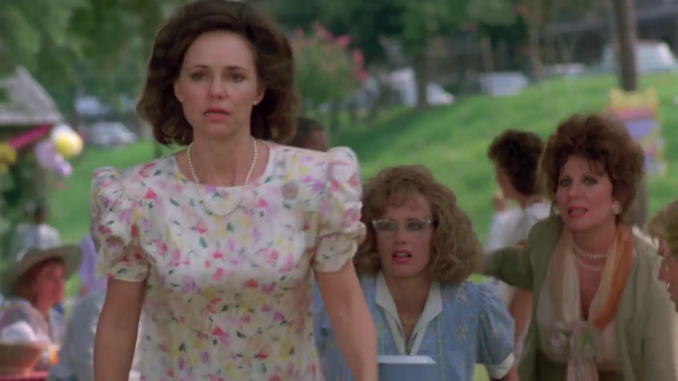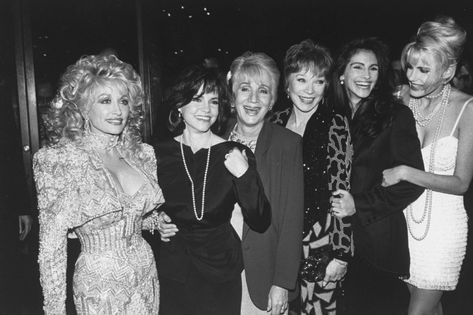
This weekend marks the 25th anniversary of that legendary ensemble dramedy, Steel Magnolias. I was planning to rewatch the film for the umpteenth time so that I could adequately put together an essay about one specific aspect of the movie — provide a specific angle, if you will. But after watching it again last night, I’ve realized I can’t do it. I can’t find one specific defining characteristic about Steel Magnolias because, just like its multi-generational cast full of incredible women (and a couple of pretty good men, too), it contains too many multitudes that make it impossible to split it from the sum of its parts. What I’m saying is: Steel Magnolias is the most perfect movie ever made.
Okay, that might seem a little hyperbolic. But I can’t think of another movie that so adeptly presents the comic and the tragic in such a perfectly balanced way. It’s a testament to Robert Harling’s script, adapted from his stage play, that crafts such fine-tuned characters that all seamlessly compliment each others personalities, desires, and flaws. So much so that the six female characters represent a complete range of the human emotional experience, exemplified by what I have described as the Steel Magnolias Stress Scale, defined below.Truvy Jones (Dolly Parton): too blessed to be stressed (except for those days when you’re running around like a one-legged man in an ass-kicking contest)

Clairee Belcher (Olympia Dukakis): carries around just a dash of bitterness while keeping a general positive outlook on life; has the propensity to make grandiose purchases.
Shelby Eatenton-Latcherie (Julia Roberts): baby- and boy-crazy, prone to diabetic shock and disregard for the consequences of poor family-planning skills.
M’Lynn Eatenton (Sally Field): a combination of worry and joy, keeps generally cool in stressful situations like those involving massive explosions and organ transplants.
Anelle Dupuy-Desoto (Daryl Hannah): operating at a state of near-constant panic, but refuses to let that affect the ability to do good hair.
Ouiser Boudreaux (Shirley MacLaine): exh
ibiting possible homicidal tendencies, usually taken out on animal-shaped desserts, and a generally sarcastic, negative outlook on life.
(If this worked like astrology, I’d personally be a M’Lynn sun, a Clairee moon, and a Ouiser rising.)
he thing I realized while watching Steel Magnolias again last night is that I couldn’t tell you the last time I saw the film from beginning to end. This is partially because of its frequent airing on Oxygen (which I will admit is wonderful because I can easily change the channel when Shelby collapses at Halloween and come back to it at the funeral scene and can pretend the movie is really about old Southern women sitting around and talking about their emotions rather than death from type-one diabetes). But what makes the movie so wonderful is, again, all of its many parts — it’s the kind of movie you can start watching a half-hour or an hour into it and still enjoy it (and, if you happen to be watching it on a cable broadcast, rest assured that you won’t miss anything because it’s very likely that it’ll air again immediately).But for the cord-cutter, who streams the film from beginning to end, it’s a refreshing reminder how complete the movie is in its entirety. Sure, it’s more difficult to avoid Shelby’s uncomfortably tragic demise, but it also allows for the viewer to recognize Sally Field’s heartbreaking performance in the film — selflessly taking on the role of caring for her daughter when, as she puts it, the men in her life (her father and her husband) aren’t strong enough to deal with the pain of losing her. The film’s climax makes it an incredible tear-jerker (possibly rivaling such Dying Ladies movies like Beaches and Terms of Endearment), but unlike other overwhelmingly melodramatic films about loss and grief, Steel Magnolias displays the power of female bonds and friendship that allow for such a loss to be experienced with a necessary levity and grace.
